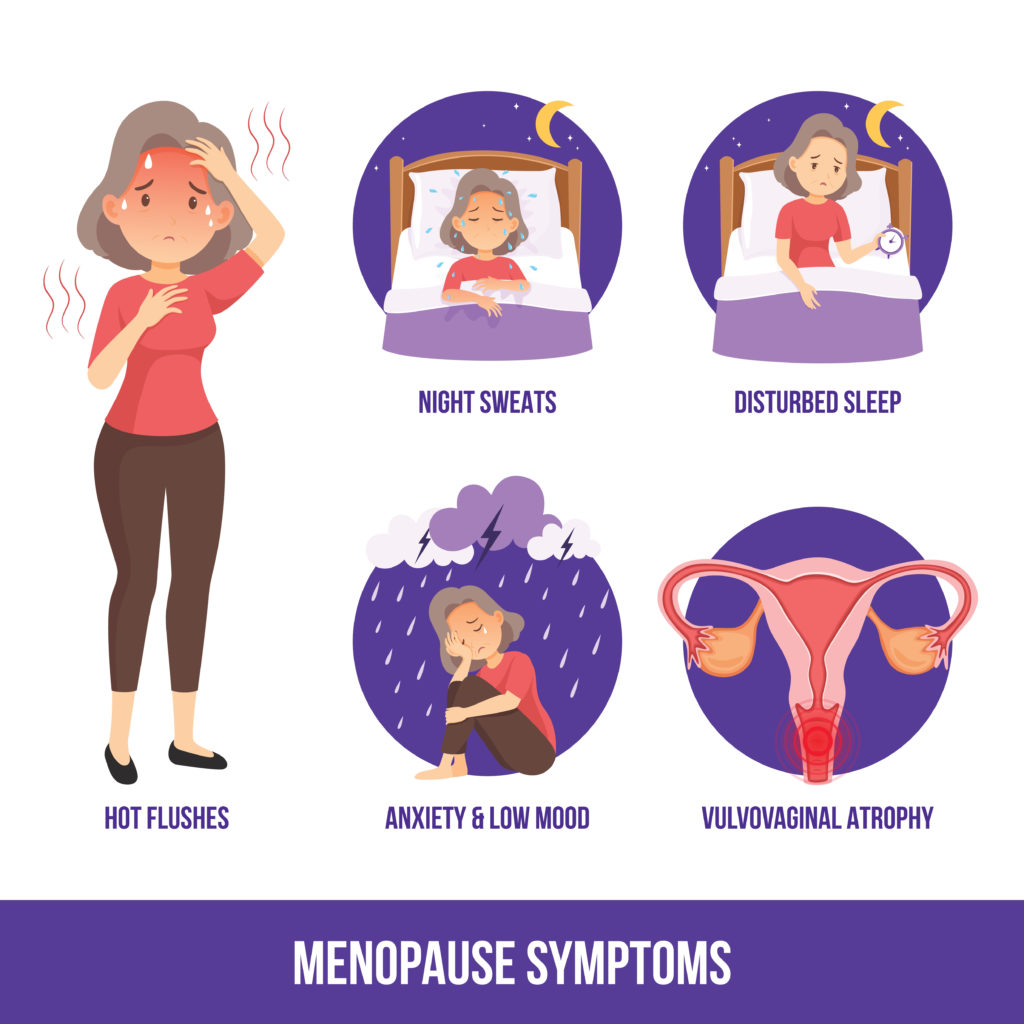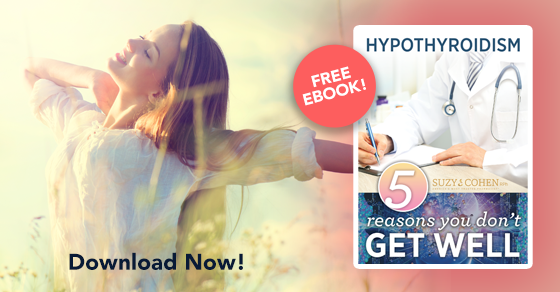What's On This Page?
ToggleMany people get through their whole life without a hot flash, and that’s great. But for others, the problem is disabling so today’s article is about natural relief for hot flashes. I tend to hear more complaints about hot flashes in the summertime and that’s because the added hot weather makes it even harder for your body to compensate and thermoregulate itself properly.
A hot flash feels slightly different to all those who experience it, but it’s a sensation of warmth throughout your body. It could feel really hot, where you start to flush. If you’ve ever taken a good brand of niacin, you may have felt something akin to a hot flash because it would have made you flush. Sometimes the hot flashes are so frequent, or intense that they are painful or disabling. If you begin researching it, you may see it defined as a “vasomotor” symptom. Symptoms of menopause vary from woman to woman.
Just FYI, men experience a similar set of problems during their andropause, which marks a reduction in testosterone. You can read more about these changes in my article, Handling Andropause and Menopause as a Couple.
Triggers for a Hot Flash include…
Smoking
Drinking alcohol
Chili or spicy foods
Caffeine drinks
Adrenal dysfunction
Stress
Obesity
Excessive oxidation in the body
Rare, but Possible Causes of Hot Flashes
Your hormone levels for estrogen
Your cortisol levels
Your hormone metabolism
Imbalanced thyroid hormone levels
Genetics
*Some Medications – see graphic below
Ethnicity

HRT is the Most Effective Treatment for Hot Flashes
Some women do not want to treat their menopausal symptoms, and that is totally okay. It’s not a disease, you don’t have to “treat” it as such. It’s possible to get these behind you and allow nature to run its course with the human body.
But most women do want to treat the condition, simply because it is ruining their life. It can become disabling for some people,
so much so, that it is one of the top reasons to visit a gynecologist or hormone specialist! If you’re seeking treatment, I’d recommend that you do not first begin with the drugs most often prescribed, those being antidepressants and sleeping pills.
Yes, you heard me right. My opinion is to NOT begin first with those, and if possible, avoid them entirely! They are just palliative treatments, and often produce such strong side effects that you fix one thing (hot flashes) but wind up with worse. I highly suggest you look into HRT instead, preferably bio-identical hormones that match your biology (hence the name).
If you can turn back time by adding a little bit of hormone (so that the levels are dialed back about 10 years prior) you might feel better. To be clear, I recommend HRT, but I don’t recommend you take the dose of a 25-year-old when you are 60 years of age.
Some practitioners are aggressive with hormones, and I do not concur with this type of treatment. But if you can get your dosage right, and hit the nail on the target, you could feel much better than you do right now, it might help with urinary incontinence, mood, sleep, and desire.
Pros and Cons of HRT
- Increases feelings of youthfulness
- Helps with urinary incontinence
- Improves texture of hair
- May relieve feelings of apathy
- May improve restorative sleep
- Increases libido
- Helps with strength and muscle mass
- May cause spotting/bleeding
- May increase anxiety
- Increases risk of hormone-driven cancer
- May not metabolize to healthy metabolites
- May increase facial hair growth
Natural Relief for Uncomfortable Hot Flashes
1. Black Cohosh (Cimicifuga racemosa) provides natural relief for hot flashes.

Generations of women have relied on the gnarled root of black cohosh to relieve various hormonal issues such as Premenstrual Syndrome (PMS) and menstrual cramps as well as hot flashes.
A wildflower and member of the buttercup family, this herbal treatment has been recommended as an alternative to standard hormone replacement therapy (HRT) by holistic practitioners. The reason is that sometimes HRT can produce unwanted side effects if it is not dosed correctly, based upon urine hormone metabolites. That’s why the DUTCH Complete (at-home) Test is so great – it evaluates urine hormone metabolites because blood tests cannot. The DUTCH test is also available on my AMAZON STORE if you prefer to shop there.
Black cohosh root has been used for about 60 years for menopausal symptoms, at least in Germany and other European countries where natural relief for hot flashes is welcomed.
So solid is the evidence for black cohosh that in 1989, black cohosh obtained Commission E status n Germany in Mar 1989 for its help in supporting menopause. Permission by the World Health Organization was granted in December 2012 for the herbal remedy to be used for menopause.
During a 6-month double-blind, placebo-controlled STUDY, 48 postmenopausal women with significant sleeping disturbances due to vasomotor symptoms were given black cohosh (BC) or a placebo. This study found that BC effectively improved sleep in postmenopausal women who had severe sleep disturbances.
Researchers conducted a 12-week double-blind, placebo-controlled study evaluating 62 postmenopausal women and bone turnover. The women in the treatment group were given 40mg of Black cohosh (BC) every day. This STUDY found that BC stimulated osteoblast activity (bone growth) and was well tolerated.
Popular Medications that May Induce a Hot Flash
Tamoxifen
Triptans which are indicated for migraines
Bone-building drugs (bisphosphonates) used for osteoporosis
Opiates (or opiate withdrawal) used for chronic pain, dental pain, cancer, and more
Steroids indicated for allergies and pain, itching, and autoimmune conditions
Niacin which is used for cholesterol (Niaspan, Slo-Niacin), also supplements
2. St. John’s Wort provides natural hot flash relief

The most famous herb used for melancholy helps with hot flashes too! Studies have shown that St. John’s wort is effective in treating menopause symptoms and mood dysphoria. It also has some sedative properties making it useful for people with insomnia. But what about safety? You’ve probably read some negative studies online about St John’s wort, however, in most studies, appropriate dosing doesn’t cause any problems, at least nothing like the drugs that are used for mood elevation.
A meta-analysis of SJW found that the herb had fewer side effects than compared to placebo and was more effective in treating symptoms associated with menopause, like hot flashes.
Over the study time frame (about 2 months), researchers have noted a reduction in the number of hot flashes, and their severity of them. But it takes about 8 weeks to work. Here’s a little more data:
This study evaluated 100 peri- and post-menopausal women using SJW for hot flash relief. After 8 weeks of consistently taking SJW, researchers found the women who took SJW had a significant reduction in the number of hot flashes they were experiencing and a significant reduction in the severity of the hot flashes. key takeaway…you must give this herb time to work.
At 4 weeks the treatment group (SJW) had little relief. Give it at least 8 weeks.
The synergistic action of St John’s Wort and Black Cohosh
So, let’s think this through together: If both black cohosh and St John’s wort offer natural hot flash relief, then what about the two together?
Yes, there is synergy in the combination! Researchers evaluated the published literature from half a dozen clinical trials and found taking both SJW and BC together was one of the most effective herbal treatments to bring hot flash relief.
-
-
-
-
-
- Supports happy mood & neurotransmitters
- May relieve symptoms of depression
- Reduces feelings of anxiety
- Improves sleep
- Reduces stress hormones
- 7 trials – a meta-analysis
- Clinically studied for synergistic benefits
-
-
-
-

3. How thyroid hormone impacts a hot flash
Too much or too little thyroid hormone will make it harder for a person to thermoregulate. If you have hyperthyroidism, a condition of excessive thyroid hormone, then you will run hot!
You will be hot in the middle of the night while you sleep. You will sweat easily and sweat more, and feel like you’re living in a hot flash! It’s not really something that you can fix with estrogen, you fix it by reducing your thyroid hormone levels.
Likewise, low thyroid hormone levels as in hypothyroidism will cause you to have poor thermoregulation as well. The thyroid gland is in charge of your core body temperature, which is something you don’t think about because it fluctuates involuntarily. Your body temperature changes constantly, and if you have hypothyroidism, your body is failing to produce enough of a hormone that is needed for proper thermoregulation. It doesn’t trigger a hot flash, but it raises your risk of having more frequent bouts of them due to the fact that you can’t effectively control your own body’s thermostat very well.
You can take medications to raise thyroid hormone or natural supplements that contain L-tyrosine, iodine, and other critical nutrients. So getting thyroid hormone balanced perfectly is critical to reducing your risk of menopause-related hot flashes, not to mention mood! Hypothyroidism will lead to mood dysphoria quite often, and treatment with SSRIs does not alter that. Some famous studies found that people responded better to thyroid hormone medicine than to classic antidepressants! If this topic interests you, read my article, 2 Steps to Making Thyroid Hormone.
If you’re interested in watching thyroid experts discuss the condition, here’s where you can buy a FLASH DRIVE of The Thyroid Summit that I co-hosted.
4. Neurokinin Receptor Antagonists are a novel treatment for a hot flash
The neurokinin receptors are being studied lately, and there are many. The neurokinin receptors 1 and 3 (designated as NK1 and NK3) operate via vagal sensory and motor systems, so they play a role in gastric motility or gut health. We know that if you can block the NK3 receptor, you could help with irritable bowel syndrome. (IBS) This is important for some individuals who have experienced more frequent bouts of IBS, diarrhea, or even tummy aches during their menopausal years. There’s more in this research article published in the British Journal of Pharmacology.
The NK1 receptor is formerly also known as the substance P receptor, which is also where opiates act. This receptor plays an important role in menopause. There was a 2020 ARTICLE published in the journal, Menopause, discussing an experimental agent “NT-814” for the treatment of vasomotor symptoms (which include hot flashes). Also, since this is such an upcoming topic never covered before here, I will provide this paper published in Neuroendicronology 2019.

Suzy Cohen, has been a licensed pharmacist for over 30 years and believes the best approach to chronic illness is a combination of natural medicine and conventional. She founded her own dietary supplement company specializing in custom-formulas, some of which have patents. With a special focus on functional medicine, thyroid health and drug nutrient depletion, Suzy is the author of several related books including Thyroid Healthy, Drug Muggers, Diabetes Without Drugs, and a nationally syndicated column.


